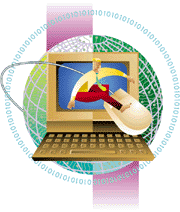Updated Information Ethics & Literacy E-Pathfinder

Title of the Topic:
“Information Literacy and Ethics for Middle and High School Students and Teachers”
Scope: The E-Pathfinder is designed to provide subject-based guides to resources on information literacy and information ethics. The E-Pathfinder resources include brief annotations, which are intended to inform teachers, to guide instruction, and to be used by middle and high school students. The E-Pathfinder topics include: Academic Honesty, Assessment Criteria, Computer Ethics, Copyright and Fair Use, Ethical Codes, Evaluation of Information Resources, Information Literacy Standards, Intellectual Property, Internet Research, Piracy, Social Responsibility, and Use of Electronic Communication Tools.
Targeted Audience: Resources for middle and high school teachers and their students, concerning information literacy and ethical issues related to information resources and the access and use of information in a variety of formats. The purpose of the E-Pathfinder is to assist teachers in helping middle and high school students develop information literacy while becoming proficient and responsible users of information resources, information technology, and information systems.
E-Pathfinder Blog Resource: http://infoethicsandlit.blogspot.com/
The “Information Literacy and Ethics” blog is an ongoing project, which includes resources to relevant information organized in subject categories and indexed by keyword and topic.
E-Pathfinder Website Resource: http://rightuse.info/
The “Information Literacy and Ethics” website is an ongoing project, providing a subject-based pathfinder to information resources organized by category.
Introduction:
“Information Literacy and Ethics for Middle and High School Students and Teachers” provides a collaborative forum, information pathfinders, information literacy tutorials, and selected resources concerning ethical research practices and the ethical use of information in all formats.
Subjects:
Academic Dishonesty
Abundant Cheating
A Critical Campus Concern, Information Ethics
Academic Dishonesty
Definitions of Academic Dishonesty
Plagiarism
Legal Aspects of Academic Dishonesty
Assessing Information Literacy
Big6 Turbo Tools
TILT
Webquests and Information Literacy: A Collaborative, Active Approach to Learning
Critical Thinking
iReading + iWriting + iThinking + T/n = L3
Code of Ethics for Educators
A Blogger's Code of Ethics
ALA Code of Ethics
A Short Webliography on Computer Ethics for Philosophers
Code of Information Ethics
Computer Professionals for Social Responsibility
InfoLit Standards
Information Literacy Standards for Student Learning
Information and Learning
3 Doors to InfoLiteracy
Information Literacy Readings
Information Literacy Forum
Information Literacy Links
Information Literacy Portals
Information Literacy Tools
Information Ethics
Applied Ethics Resources on WWW
Information Ethics Problem of the Month
Information Ethics Tutorial
National Forum on Information Literacy
Open Directory: Computers, Ethics
Resources on Computer and Ethics
Ten Commandments Of Computer Ethics
Information Literacy and Learning
About Information Literacy
ACRL Information Literacy
Information Literacy
Information Literacy and Access to Resources
Information Literacy Weblog
Information Literacy Models
"The Seven Pillars of Information Literacy" Model
What is information literacy?
Information Literacy Skills
Lessons for developing skills in the areas of:
Questioning
Identifying & Collecting
Evaluating
Sensemaking
Reflecting & Refining
Using
Assessing
21st Century Information Fluency Project
Intellectual Freedom
ALA Intellectual Freedom Statements and Policies
Censorship and Intellectual Freedom FAQs
Censorship, the Internet, Intellectual Freedom, and Youth
Democracy and Intellectual Freedom
Intellectual Freedom and Censorship
Professional Guidelines
"Simulated Intellectual Freedom Debate"
Intellectual Property
Copyright and Fair Use
Copyright, Privacy, and Intellectual Property
Electronic Frontier Foundation: Intellectual Property
Intellectual Property
ithenticate
Research Resources
Turnitin
Understanding Copyrights
What Is Plagiarism?
Internet Ethics
Applied Ethics Resources on WWW
The Berkman Center for Internet and Society at Harvard Law School
Computer Literacy
Computer Professionals for Social Responsibility
A Critical Campus Concern, Information Ethics
Internet Research Ethics
The Internet, Ethics, Plagiarism, and AUPs
Internet Ethics: Oxymoron or Orthodoxy?
An Online Interactive Course in Internet Ethics
Resources on Computer and Ethics
Teaching Internet Ethics to Teens
Open Courseware
Models for Sustainable Open Educational Resources
Open Directory Project
Piracy
Anti-Piracy
The Free Software Foundation
Software Piracy
Types of Piracy
Website Evaluation
Website Evaluation Criteria
Website Evaluation Tutorial

Print Reference Sources:
American Association of School Libraries. (1998). Information power: Building partnerships for learning (2nd ed.). Chicago, IL: American Library Association.
Birk, J. & Hunt, F. (2003). Hands-on information literacy activities. New York: Neal-Schumann.
Brevik, P.S. (1998). Student learning in the information age. Phoenix, AZ: Oryx Press.
Eisenberg, M.B., Lowe, C.A., & Spitzer, K.L. (2004). Essential skills for the information age (2nd ed.) . Westport, CT: Libraries Unlimited.
Harris, F. J. (2005). I found it on the Internet: Coming of age online. Chicago, IL: American Library Association.
Hughes-Hassell, S. & Wheelock, A. (2001). Information-powered school. Chicago, IL: American Library Association.
Lessig, L. (2002). The future of ideas: The fate of the commons in a connected world. New York: Random House.
Loertscher, D.B., & Wools, B. (2002). Information literacy: A review of the research. San Jose, CA: Hi Willow Publishing.
Riedling, A.M., & Eisenberg, M.B. (2002). Learning to learn: A guide to becoming information literate. New York: Neal-Shumann.
Riedling, A.M. (2004). Information literacy: What does it look like in the school library media center. Portsmouth, NH: Libraries Unlimited.
Simpson, C. (Ed.). (2003). Ethics in school librarianship: A reader. Worthington, OH: Linworth.
Spinello, R.A., & Tavani, H.T. (2004). Readings in cyberethics (2nd ed.). Boston, MA: Jones and Bartlett.
Tavani, H.T. (2004). Ethics & technology: Ethical issues in an age of information and communication technology. Hoboken, NJ: John Wiley $ Sons.
Thomas, N.P. (2004). Information literacy and information skills instruction: Applying research to practice in the school library media center. (2nd ed.)
Warlick, D.F. (2004). Redefining literacy for the 21st century. Worthington, OH: Linworth.
Woodbury, M.C. (2003). Computer and information ethics. Champaign, IL: Stipes.



0 Comments:
Post a Comment
<< Home